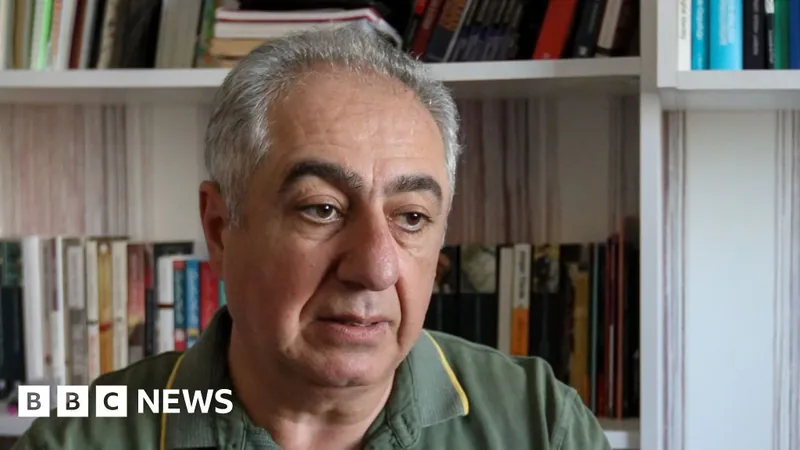
Major Shifts in Hong Kong and Malaysia's Financial Landscape This Week
2024-11-11
Author: Wai
In a week filled with pivotal financial developments, Qi Bin, the vice-president and deputy chief investment officer of the China Investment Corporation (CIC), is set to make a significant move. Qi is expected to join the central government’s liaison office in Hong Kong, a key step as Beijing continues to bolster Hong Kong’s role as a global financial center. Speculation suggests that Qi will assume the role of deputy director, where he will oversee economic affairs, helping to coordinate policies between the mainland and Hong Kong. This appointment highlights China's commitment to maintaining and enhancing Hong Kong's status amid ongoing global financial challenges.
In Malaysia, the government is actively pursuing the establishment of family offices to attract affluent residents and foreign investors. Finance Minister II, Amir Hamzah Azizan, revealed plans to draw in family offices managing between RM500 million ($114 million) and RM1.2 billion ($272 million) in assets over the next five years. This initiative is projected to generate between RM40 million to RM110 million ($9 million to $25 million) in local investments, particularly in high-growth and high-value sectors. Interestingly, a report by Deloitte anticipates that the number of single-family offices worldwide will surge by 75% over the next few years, growing from 8,030 to more than 10,720 by 2030, with assets under management expected to rise from $3.1 trillion to $5.4 trillion.
Global Investment News Updates
In a troubling development, major superannuation fund HESTA has put Mineral Resources (MinRes) on its watchlist due to significant governance issues involving founder Chris Ellison. Ellison's alleged misuse of company resources and underreporting of income has sparked potential penalties that could reach as high as $6.6 million. HESTA's CEO has expressed serious concerns about MinRes's response to these governance failures, hinting at possible escalations, including voting against directors.
The Hong Kong Monetary Authority has forged a strategic partnership with various organizations, including the Asian Infrastructure Investment Bank, to channel $500 million into climate investments. These efforts will focus on sectors vital to achieving net-zero emissions and include renewable energies and sustainable transportation.
The Japan Government Pension Investment Fund (GPIF), the world's largest pension fund, has reported a staggering loss of $59.95 billion in Q2 FY2024. This downturn has been attributed to a tumultuous Japanese market, where domestic equities saw significant declines triggered by rising interest rates. Notably, despite the loss, GPIF has maintained a 4.26% annualized return since its inception in 2001.
Korea Post is actively seeking advisory and investment services for a substantial $130.5 million hedge fund portfolio. This marks the organization’s ongoing strategy to enhance its investment management capabilities.
The Employees Provident Fund has seen a striking 20% rise in investment income for the first three quarters of 2024, amounting to MYR57.57 billion ($13 billion). This positive trend contrasts sharply with recent controversies surrounding a $10 million loss from state funds invested in a failed online fashion retailer, prompting scrutiny from Prime Minister Anwar Ibrahim.
Turning to Canada, the provincial government of Alberta has dismissed the entire board of Alberta Investment Management Corp due to poor investment returns. The government is now taking a more direct approach by appointing the finance minister to oversee AIMCo temporarily while searching for new leadership.
These swift shifts and developments in both Hong Kong and Malaysia signal a transformative period for the financial sectors of these regions, with potential implications for investors and policymakers alike. Stay tuned for the latest updates as these stories unfold!




 Brasil (PT)
Brasil (PT)
 Canada (EN)
Canada (EN)
 Chile (ES)
Chile (ES)
 España (ES)
España (ES)
 France (FR)
France (FR)
 Hong Kong (EN)
Hong Kong (EN)
 Italia (IT)
Italia (IT)
 日本 (JA)
日本 (JA)
 Magyarország (HU)
Magyarország (HU)
 Norge (NO)
Norge (NO)
 Polska (PL)
Polska (PL)
 Schweiz (DE)
Schweiz (DE)
 Singapore (EN)
Singapore (EN)
 Sverige (SV)
Sverige (SV)
 Suomi (FI)
Suomi (FI)
 Türkiye (TR)
Türkiye (TR)